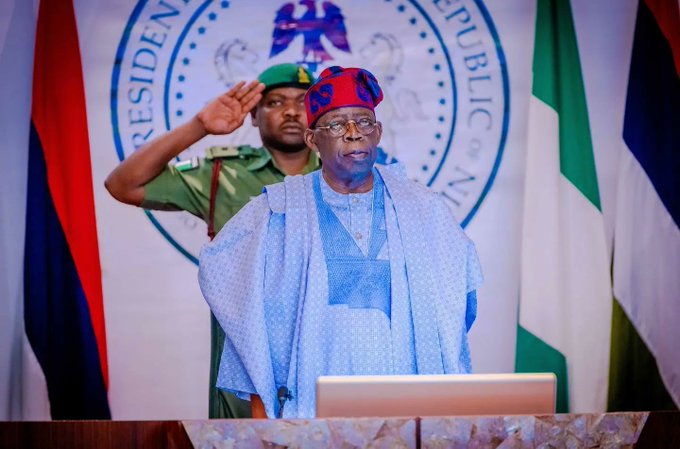ECOWAS: President Tinubu’s re-election and the challenges ahead
At the 65th Ordinary Session of the of the Authority of Heads of States and Government, which was held at the Presidential Villa in Abuja, President Bola Ahmed Tinubu was re-elected as the Chairman of the Economic Community of West African States (ECOWAS). He was first elected to the position on July 9, 2023. In […]

Tinubu
At the 65th Ordinary Session of the of the Authority of Heads of States and Government, which was held at the Presidential Villa in Abuja, President Bola Ahmed Tinubu was re-elected as the Chairman of the Economic Community of West African States (ECOWAS). He was first elected to the position on July 9, 2023.
In his address following his re-election, President Tinubu said: “I have accepted to continue to deliver on this service with the great men and women on this democratic journey to serve our interest and build democratic values on the structure we inherited.”
President Tinubu’s re-election came at a time of great challenges in the West African sub-region, Africa and the world.
At the time of his first election, the sub-region was confronted with the overthrow of democratic civilian governments in Mali, Guinea and Burkina Faso. As a consequence of that, ECOWAS unanimously voted to impose a wide range of sanctions on the military rulers of the countries involved as part of efforts to force them to restore democratic rule.
- Russia refutes Ukraine’s claims on children’s hospital attack in Kyiv
- I’ll play as long as I can play and win – Woods
On July 26, shortly after President Tinubu was elected as chairman of the regional group, which was just after he was inaugurated as president of Nigeria on May 29, 2023, there was another military coup in Niger in which President Mohamed Bazoum was overthrown. As chairman of the body, President Tinubu was mandated to lead the ECOWAS in compelling the Niger military rulers, along with the other military regimes in the region, to immediately restore democracy or face further sanctions, including military action.
Within the one year of his stewardship of ECOWAS, the military regimes have not only remained recalcitrant, they have continued their defiance by pulling out of the regional body and forming their alternative group, which they called the Association of Sahel States.
In addition to these immediate challenges in the sub-region, President Tinubu, as ECOWAS chairman, was confronted with an increasingly fractured world in which the powerful countries of the world are coming head-to-head in their competition for spheres of influence. The implications of these conflicts are that the post-Second World War global order is becoming unhinged as emerging powers stake their claims in the global system.
In all these, Africa has continued to not only miss out, but to become a pawn in the geo-strategic game going on in the world. In many instances, it has been demonstrated by these powers that Africa is only relevant to them as a treasure trove of the mineral resources it possesses, and as a market to dump their goods.
It is noticeable that as countries in other regions of the world are consolidating their efforts to face up to the changing global order, African states are mired deep in one conflict and contradiction after the other. Some African countries are at war internally with political and ethnic factions going at each other and externally against their neighbours.
There is also the perennial factor of economic challenges leading to increasing poverty, environmental degradation, insecurity along with its related issues of displacement of people and their livelihoods.
Regrettably, all these issues are prevalent in the West African sub-region which President Tinubu, as the chairman of ECOWAS, is faced with. It is noteworthy that he has pledged to work in concert with fellow heads of state to resolve these issues systemically. In this regard, it is commendable that Tinubu has, as a matter of priority, appointed the president of Senegal, Bassirou Faye, to be assisted by Nigeria’s Foreign Affairs Minister, Yusuf Tuggar, to initiate a process of rapprochement with the military rulers of Guinea, Mali, Burkina Faso and Niger, with a view to bringing them back to the ECOWAS fold.
We believe that Africa cannot hold its own in an emerging global order if it continues to be divided into factions with its states perpetually at loggerheads with one another. African leaders need to understand that the world out there is increasingly growing weary of Africans and the African continent, and sees our situation as hopeless. It behooves then on African leaders to stand to the fact that the days when the world and its institutions used to show concern on African issues are gradually going.
